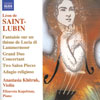Saint-Lubin Violin Works Vol. 1
Graceful and vivacious performances throw light on a forgotten composer
View record and artist detailsRecord and Artist Details
Composer or Director: Léon de Saint-Lubin
Genre:
Chamber
Label: Naxos
Magazine Review Date: 8/2009
Media Format: CD or Download
Media Runtime: 75
Mastering:
Stereo
DDD
Catalogue Number: 8 572019

Tracks:
| Composition | Artist Credit |
|---|---|
| Grand Duo Concertant |
Léon de Saint-Lubin, Composer
Anastasia Khitruk, Violin Elizaveta Kopelman, Piano Léon de Saint-Lubin, Composer |
| Fantaisie sur un thème de Lucia de Lammermoor |
Léon de Saint-Lubin, Composer
Anastasia Khitruk, Violin Léon de Saint-Lubin, Composer |
| Thème original et Etude de S. Thalberg |
Léon de Saint-Lubin, Composer
Anastasia Khitruk, Violin Léon de Saint-Lubin, Composer |
| Adagio religioso |
Léon de Saint-Lubin, Composer
Anastasia Khitruk, Violin Elizaveta Kopelman, Piano Léon de Saint-Lubin, Composer |
| Potpourri on themes from Auber's 'La Fiancée' |
Léon de Saint-Lubin, Composer
Anastasia Khitruk, Violin Elizaveta Kopelman, Piano Léon de Saint-Lubin, Composer |
| Salonstücke No 1 |
Léon de Saint-Lubin, Composer
Anastasia Khitruk, Violin Elizaveta Kopelman, Piano Léon de Saint-Lubin, Composer |
| Salonstücke No 2 |
Léon de Saint-Lubin, Composer
Anastasia Khitruk, Violin Elizaveta Kopelman, Piano Léon de Saint-Lubin, Composer |
Author: DuncanDruce
Listeners will judge for themselves, but to me Schumann’s verdict seems harsh. Saint-Lubin’s easy, fluent style admits no profundity but his music has considerable charm and some original ideas. He shows resource and imagination not only in writing for the violin (the two unaccompanied pieces are both extremely effective) but also for piano. Even where the piano has the role of accompanist, as in the Salonstücke, its part is full of interest, emerging, in the Grand duo and the Auber Potpourri, as equal partner with the violin, the dialogue between the two most expertly managed.
Anastasia Khitruk and Elizaveta Kopelman are ideal advocates for Saint-Lubin, a well matched duo who clearly enjoy and make the most of the virtuosity, and bring the more expressive passages to life in a graceful, vivacious way. I’d love to hear them in more substantial repertoire from this period – the Mendelssohn F major Sonata or the Schubert Fantasie, perhaps.
Discover the world's largest classical music catalogue with Presto Music.

Gramophone Digital Club
- Digital Edition
- Digital Archive
- Reviews Database
- Full website access
From £8.75 / month
Subscribe
Gramophone Full Club
- Print Edition
- Digital Edition
- Digital Archive
- Reviews Database
- Full website access
From £11.00 / month
Subscribe
If you are a library, university or other organisation that would be interested in an institutional subscription to Gramophone please click here for further information.




